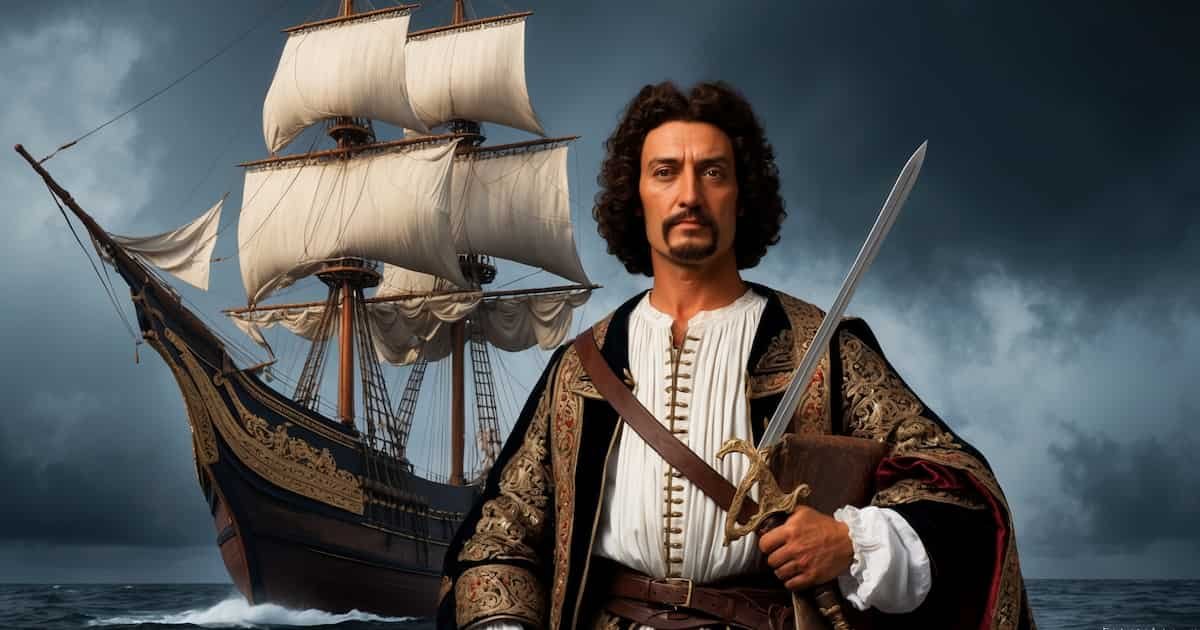
Ferdinand Magellan was a Portuguese explorer who is best known for leading the first expedition to successfully circumnavigate the globe.
If you’re ever feeling down and think the world is against you then take a look at what Ferdinand Magellan faced.
Born in 1480, Magellan initially served Portugal but later sailed under the Spanish flag. In 1519, he set out with a fleet of five ships to find a westward route to the Spice Islands (modern-day Maluku Islands in Indonesia).
Although Magellan himself was killed in the Philippines in 1521, his expedition, under the command of Juan Sebastián Elcano, completed the journey in 1522.
Magellan’s voyage had several significant impacts that continue to affect our lives today:
- Global Navigation and Trade: His expedition proved that the Earth is round and that it is possible to sail around it. This paved the way for future global navigation and trade, which has shaped the interconnected world we live in today.
- Cultural Exchange: The circumnavigation facilitated the exchange of goods, ideas, and cultures between different parts of the world. This exchange has had a profound influence on global cultures, economies, and societies.
- Scientific Knowledge: The journey provided valuable information about the geography of the world, including previously unknown lands and seas. This contributed to the advancement of cartography and navigation techniques.
- Colonization and Expansion: Magellan’s voyage marked the beginning of European exploration and colonization in Asia and the Pacific. This had lasting effects on the political and social structures of many regions.
- Economic Impact: The establishment of new trade routes and the discovery of new lands had significant economic implications, leading to the rise of global trade networks that continue to influence the global economy today.
Compare our daily battles to Magellan’s
Ferdinand Magellan faced numerous challenges and battles throughout his expedition to circumnavigate the globe. These battles were not only physical but also logistical, political, and interpersonal. Here are some of the key types of battles he encountered:
- Naval Engagements and Skirmishes:
Battle of Mactan: The most notable battle Magellan fought was the Battle of Mactan in the Philippines. On April 27, 1521, Magellan and his men attempted to subdue the local chieftain, Lapu-Lapu, who resisted Spanish colonization. Magellan was killed in this battle.
- Mutinies and Crew Rebellions:
Mutiny in Patagonia: In April 1520, while the fleet was anchored in Patagonia (modern-day Argentina), several of Magellan’s captains mutinied against him. Magellan managed to suppress the mutiny, executing some of the ringleaders and imprisoning others.
- Navigational Challenges:
Strait of Magellan: Navigating through the treacherous waters of the strait that now bears his name was a significant challenge. The strait’s unpredictable weather, strong currents, and narrow passages posed serious risks to the fleet.
- Supply Shortages and Starvation:
Pacific Crossing: The crossing of the Pacific Ocean was one of the most arduous parts of the journey. The fleet faced extreme shortages of food and fresh water, leading to scurvy and starvation among the crew. Many sailors died during this leg of the voyage.
- Hostile Encounters with Indigenous Peoples:
Throughout the journey, Magellan and his crew had various encounters with indigenous peoples. Some of these encounters were peaceful and involved trade and diplomacy, while others were hostile and involved skirmishes and conflicts.
- Internal Conflicts and Leadership Struggles:
Magellan faced constant challenges to his authority from within his own ranks. Managing a diverse and often fractious crew, which included Spaniards, Portuguese, and other nationalities, required strong leadership and diplomacy.
- Political and Diplomatic Battles:
Magellan had to navigate the complex political landscape of the time, balancing the interests of the Spanish Crown with those of local leaders and rival European powers. Securing alliances and managing diplomatic relations were crucial for the success of the expedition.
Conclusion
If you’re ever feeling down and think the world is against you then remember what Ferdinand Magellan faced.
These battles highlight the multifaceted nature of the challenges Magellan faced. His ability to navigate these difficulties, despite ultimately losing his life in the process, underscores his determination and the monumental nature of his expedition.
In essence, Magellan’s expedition was a pivotal moment in history that set the stage for the modern, interconnected world, influencing everything from global trade and cultural exchange to scientific understanding and economic development.
Related content:
- The Psychology of Why Your Kindness Can Turn Into Disrespect
- The Psychology of Guilt Corrects, Shame Withdraws: Why This Distinction Changes Everything
- The Unexpected Power of What We Say: A Reflection on “Hung by the Tongue”
- The Key Component For Social Magnetism
- Mysteries of How To Be Happy Revealed